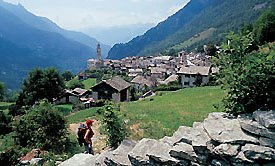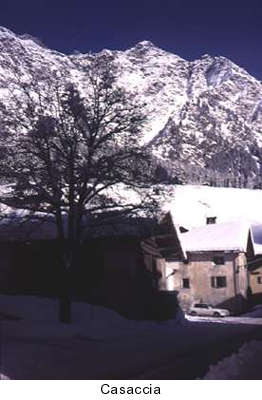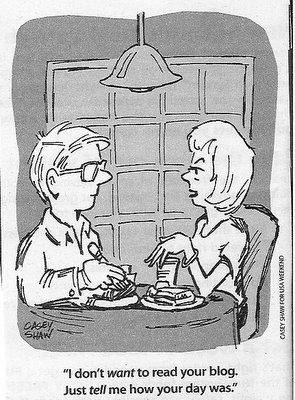

http://www.myswitzerland.com/en/navpage.cfm?category=Hike4&subcat=Graubuenden&id=29968
Soglio is the picture at the top.
In another post, I told you about my hike from Bergun to Preda. Sometime after that, I was back in Bergun for another overnight to repeat that hike. Instead of going home the next day, I took a train from Bergun the next day, up to Preda, through the Albula tunnel, down to Samedan, and on to the St. Moritz train station to catch a postal bus. This was easily done in an hour or so, and then I took the bus over the Maloja Pass to a tiny village called Casaccia. This place boasts a population of one hundred, but I only saw one, the lady in the grocery who sold me stuff for a picnic.
Across the road, I followed the signs going to a path that would in a few hours bring me to Soglio. Next there is a description of "La Panoramica", the trail I took. This comes from the website for Bergell at the same address as above.
*****************************************************************
Panoramic Trail
The Panoramic Trail (La Panoramica) begins in Casaccia and leads you along the right-hand side of the valley, through romantic and unspoiled woods, down to Soglio. The trail was completed in 1973, and is very clearly marked with signposts. There are no significant changes in the slope of the trail and it is often referred to as one of the most beautiful hikes in the Canton Graubunden. From different look-out points scattered along the trail, nature lovers and photographers can admire the valley’s many famous mountain peaks.
Beginning in Casaccia, the trail takes you to the west, along the right-hand side of the valley, over the Maira Bridge, and across flat meadows to the little Lake of Labbia. The trail continues following the signposts (painted white, red and white) down a slight slope, first to Barga, and then to Roticcio, a small village surrounded by woods of pine and birch trees. After an encounter with the impetuous mountain stream, Aua of Mulina, the trail climbs across steep little meadows and through flat pine woods. From here you can see the village of Vicosporano down below. For a short distance, the path continues downhill and then passes through thick dark woods towards Durbeggia, where it is very pleasant to stop for a rest and admire the beautiful scenery. The stupendous panorama of the mountain peaks of the Bondasca becomes more and more impressive as you finally approach the clearing in the woods where you cross the mountain stream, Valer. A narrow path takes you through woods and across meadows, towards Pravis, as far as the stables of Parlongh. The trail follows the natural terrain of the mountains, up and down, but maintains an almost constant altitude until it reaches Soglio, where it drops suddenly. Emerging from a rocky landscape, you enter Soglio’s warm green meadows.
****************************************************************
The hike was great. On the valley wall on the north side of the valley, you are presented with a panorama of massive mountains and glaciers. The trail varies little in its elevations after you reach the main path. It is interspersed with creeks and falls that are not hard to ford, and for some distances, the path is paved with flat stones. Several plateaus afford one a nice place to stop and gawk, drink, or picnic. Usually these are places where one can take a path down to a village along the valley floor. My goal that day was to reach Soglio where I had booked a room in the Hotel La Soglina.
Soglio is a village pearched on the valley wall above the town of Promontogno in the valley floor. It looks like time just forgot to move onward at first, but it is a village with a church, hotels, etc. Most of it just looks very old. It is old. I found a stone in the church cemetery for an English woman who died there many years ago. Bet there was a real story there.
The hotel was almost new. The bath had a wonderful tub in which to soak, and the cool beer on the patio was a tonic. Dinner that evening in the restaurant was a treat too.
The next day, I was out and in the village for a quick look before catching a bus down to Castasegna. That done, I got on a Swiss postal bus that went through a bit of Italy on its way to Lugano. I had remembered to bring my passport with me. I felt that the driver should have had a nice tip because the villages had streets so narrow that had a window been opened, one could have reached into the rooms of the houses. At Lugano, it was onto the train to home through the Gotthard Valley.
I've got to do this again next fall!



